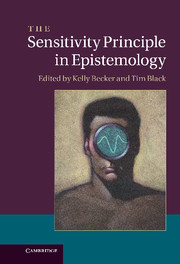Book contents
- The Sensitivity Principle in Epistemology
- The Sensitivity Principle in Epistemology
- Copyright page
- Contents
- Contributors
- Preface
- Chapter 1 The resilience of sensitivity
- Part I Defenses, applications, explications
- Part II Criticism
- Part III In favor of safety over sensitivity
- Part IV Sensitivity without subjunctives
- Chapter 13 Roush on knowledge:
- Chapter 14 Sensitivity and closure
- Bibliography
- Index
Chapter 14 - Sensitivity and closure
from Part IV - Sensitivity without subjunctives
Published online by Cambridge University Press: 05 September 2012
- The Sensitivity Principle in Epistemology
- The Sensitivity Principle in Epistemology
- Copyright page
- Contents
- Contributors
- Preface
- Chapter 1 The resilience of sensitivity
- Part I Defenses, applications, explications
- Part II Criticism
- Part III In favor of safety over sensitivity
- Part IV Sensitivity without subjunctives
- Chapter 13 Roush on knowledge:
- Chapter 14 Sensitivity and closure
- Bibliography
- Index
Summary
- Type
- Chapter
- Information
- The Sensitivity Principle in Epistemology , pp. 242 - 268Publisher: Cambridge University PressPrint publication year: 2012
- 12
- Cited by

